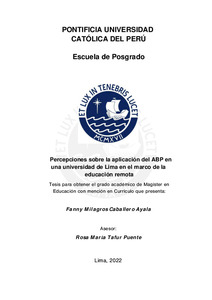| dc.contributor.advisor | Tafur Puente, Rosa María | |
| dc.contributor.author | Caballero Ayala, Fanny Milagros | |
| dc.date.accessioned | 2022-06-25T11:55:40Z | |
| dc.date.available | 2022-06-25T11:55:40Z | |
| dc.date.created | 2022 | |
| dc.date.issued | 2022-06-25 | |
| dc.identifier.uri | http://hdl.handle.net/20.500.12404/22701 | |
| dc.description.abstract | La presente investigación tiene como objetivo general analizar las percepciones de
los estudiantes y docentes sobre la aplicación del ABP (Aprendizaje basado en
problemas) en un curso de una universidad privada de Lima, a partir de la rápida
migración de la presencialidad a la educación remota por la emergencia sanitaria
por COVID-19.
Para ello, se exploró el contexto de la educación remota durante la emergencia
sanitaria por COVID-19, en el que se desarrolló la enseñanza universitaria. Se
indagó acerca del ABP, su historia y su desarrollo, sus aspectos conceptuales, lo
objetivos que plantea, algunos aspectos de la implementación y cómo fue la
adaptación del ABP presencial a la educación remota por la crisis sanitaria.
Asimismo, se revisó algunos estudios sobre el ABP.
La investigación se ha abordado desde el método cualitativo a partir del análisis de
las experiencias de los principales involucrados. Como técnica e instrumento de
recolección de datos, se empleó la entrevista semiestructurada y el guion de
entrevista. Y para el análisis de la información se aplicó la técnica del open coding.
Finalmente, el análisis y discusión de resultados ha permitido concluir que la
aplicación del ABP en el contexto de educación remota ha contado con aspectos
positivos y dificultades, pese a las cuales, es posible una versión semipresencial de
la misma, que potencie los aprendizajes para el siglo XXI. Se concluye que los
estudiantes y docentes están satisfechos con el desarrollo de la mayoría de los
objetivos que persigue el ABP, entre los cuales están las habilidades de resolución
de problemas, colaboración, aprendizaje autodirigido y ayuda en la motivación
intrínseca de los estudiantes. Respecto al objetivo de construir una base de
conocimientos amplia y flexible en los estudiantes, se concluye que estos no están
satisfechos con dicho desarrollo, mientras que los docentes sí lo están. | es_ES |
| dc.description.abstract | The main objective of this research is to analyze the perceptions of students and
professors about the application of PBL (Problem-based learning) in a course at a
private university in Lima, after the rapid migration from in-person classes to remote
education due to the COVID-19 pandemic.
For this purpose, this research explores the context of remote education during the
COVID-19 pandemic in which university education took place. We investigated the
history and development of PBL, its related concepts and objectives, some
characteristics of the implementation and how it was adapted from face-to-face PBL
to remote education in the context of the health crisis. Also, some research on PBL
was reviewed.
This research has been approached from the qualitative method based on the
analysis of the experiences of the main people involved. The semi-structured
interview and the interview script were used as the data collection technique and
instrument. And for the analysis of the information, the open coding technique was
used.
Finally, the analysis and discussion of results led to the conclusion that the
application of PBL in the context of remote education has had positive aspects and
difficulties, despite which, a blended learning version of it is possible, which
enhances learning for the 21st century. It is concluded that students and professors
are satisfied with the development of most of the objectives pursued by PBL (such
as: problem-solving skills, collaboration, self-directed learning and help in the
intrinsic motivation of students). Regarding the objective of building a broad and
flexible knowledge base in students, the conclusion is that students are not satisfied,
while professors are. | es_ES |
| dc.language.iso | spa | es_ES |
| dc.publisher | Pontificia Universidad Católica del Perú | es_ES |
| dc.rights | info:eu-repo/semantics/openAccess | es_ES |
| dc.rights.uri | http://creativecommons.org/licenses/by/2.5/pe/ | * |
| dc.subject | Educación superior--Investigaciones | es_ES |
| dc.subject | Aprendizaje basado en problemas | es_ES |
| dc.subject | Educación a distancia--Perú--Lima | es_ES |
| dc.subject | COVID-19 (Enfermedad)--Impacto | es_ES |
| dc.title | Percepciones sobre la aplicación del ABP en una universidad de Lima en el marco de la educación remota | es_ES |
| dc.type | info:eu-repo/semantics/masterThesis | es_ES |
| thesis.degree.name | Maestro en Educación con mención en Currículo | es_ES |
| thesis.degree.level | Maestría | es_ES |
| thesis.degree.grantor | Pontificia Universidad Católica del Perú. Escuela de Posgrado | es_ES |
| thesis.degree.discipline | Educación con mención en Currículo | es_ES |
| renati.advisor.dni | 08210460 | |
| renati.advisor.orcid | https://orcid.org/0000-0002-7481-8804 | es_ES |
| renati.author.dni | 43430973 | |
| renati.discipline | 191327 | es_ES |
| renati.juror | Manrique Villavicencio, Lileya | es_ES |
| renati.juror | Tafur Puente, Rosa Maria | es_ES |
| renati.juror | Capetillo Medrano, Carla Beatriz | es_ES |
| renati.level | https://purl.org/pe-repo/renati/level#maestro | es_ES |
| renati.type | https://purl.org/pe-repo/renati/type#tesis | es_ES |
| dc.publisher.country | PE | es_ES |
| dc.subject.ocde | https://purl.org/pe-repo/ocde/ford#5.03.01 | es_ES |






